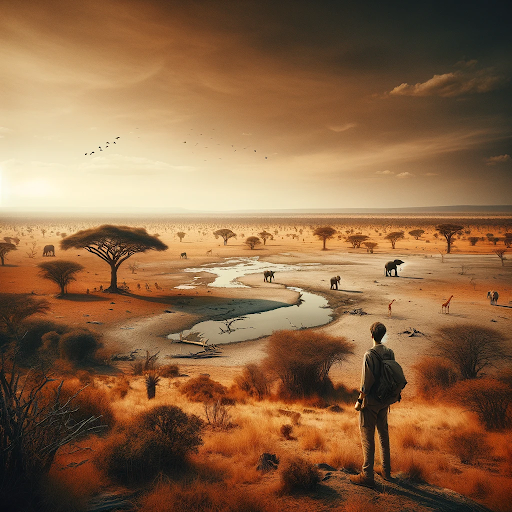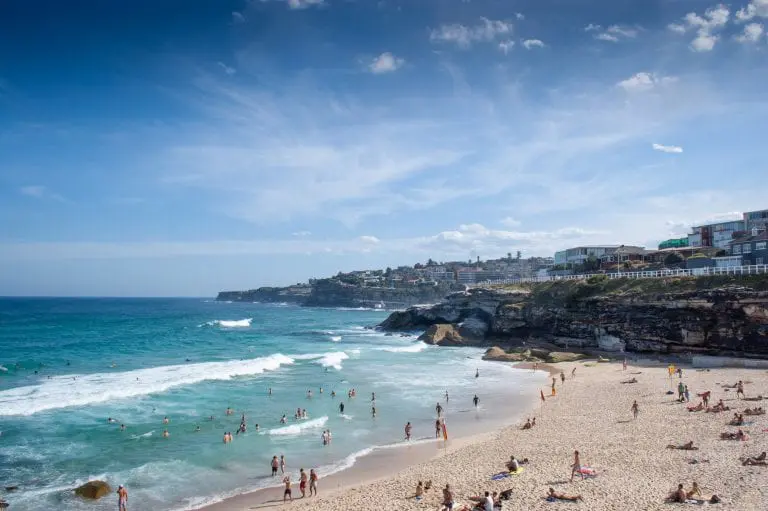Climate Change’s Impact on African Safaris: Traveler Insights

Climate change is leaving an indelible mark on Africa’s iconic safari landscapes. As extreme weather reshapes the wilderness, the safari industry and wildlife face unprecedented challenges in preserving this beloved tradition.
Extreme weather is leaving its mark on African safari vacations
For decades, Africa’s lush savannahs and teeming waterholes have attracted adventurers from around the world to embark on the journey of a lifetime: an African safari tour. However, an ominous force is disrupting this iconic experience: climate change.
In recent years, El Niño’s effects on African landscapes have been devastating, as severe droughts have turned once-thriving ecosystems into barren wastelands.
The statistics paint a grim picture of safaris in South Africa:
- In 2019, over 200 elephants perished in Zimbabwe’s Hwange National Park due to extreme drought conditions.
- Between 2018 and 2023, thousands more wild animals succumbed to the relentless drought effects on African elephants and other species across the Horn of Africa.
- Despite the much-anticipated return of rains, their intensity has proven overwhelming, causing widespread flooding and subsequent habitat destruction.
As the world grapples with the impacts of climate change on African safari tours, the African wilderness finds itself at a precarious crossroads, with wildlife and the tourism industry scrambling to adapt.
Redefining safari trips in a changing world
Traditionally, safari operators have meticulously planned African safari tours around the cyclical patterns of nature, aligning them with optimal seasons for wildlife viewing and migration spectacles. However, changing safari seasons due to climate change have thrown a wrench into these carefully choreographed experiences.
- Delayed rainfall or unexpected dry spells have disrupted the predictability of lush vegetation growth and water availability, forcing animals to alter their movements.
- This unpredictability poses challenges for safari bookings and travel planning. Visitors may find themselves at the wrong place at the wrong time, missing out on the quintessential sightings they had anticipated.
To combat this, the safari industry is turning to cutting-edge technology and predictive modeling to anticipate and adapt to changing safari seasons. Operators can adjust their itineraries accordingly by closely monitoring climate patterns and animal behaviors, ensuring travelers get the most out of their once-in-a-lifetime African safari experience.
Africa’s Wildlife Facing Existential Threats
The impact of climate change on African wildlife extends far beyond mere inconvenience for African tours. It poses an existential threat to numerous species that are the heart and soul of the African safari tour experience.
- Changing climate patterns have disrupted wildlife migration and cycles, forcing animals to venture into unfamiliar territories in search of sustenance.
- The delicate balance of biodiversity is being upended, as some species struggle to adapt while others face the risk of extinction.
- Iconic species like the African elephant are particularly vulnerable, with drought effects leading to starvation, reproductive failure, and human-wildlife conflict as they encroach on human settlements in desperation.
The African elephant, a keystone species has experienced a catastrophic population decline in recent decades.
This alarming statistic serves as a grim reminder of the precarious state of Africa’s wildlife and the pressing need for concerted efforts to mitigate the threats posed by habitat fragmentation, illegal poaching, and the escalating repercussions of climate change.
Yet, amidst this adversity, stories of resilience emerge. Certain species have exhibited remarkable adaptability, finding innovative ways to navigate climate change. However, their future remains uncertain, hinging on the collective efforts of conservationists and eco-conscious travelers alike.
Eco-Warriors: Safeguarding the Safari Legacy on African Safari Trips
In the face of adversity, the safari industry has rallied around a common cause: sustainable tourism and environmental conservation. Eco-friendly safari practices have become the new norm, with operators leading the charge in reducing their carbon footprint and implementing innovative solutions.
- Safari lodges are embracing renewable energy solutions, harnessing the power of solar and wind to minimize their reliance on fossil fuels.
- Water conservation measures, such as the use of solar-powered boreholes, are ensuring that precious resources are available for both human and animal populations.
- Educational initiatives are raising climate change awareness in African safari tours and empowering travelers to make more informed and responsible choices.
These efforts extend beyond tokenism, as demonstrated by the tangible impacts they’re having on the ground. In Hwange National Park, for instance, the installation of solar-powered boreholes has provided life-sustaining water for the park’s 45,000 elephants, demonstrating the power of sustainable eco-tourism in Africa.
Embarking on an Eco-Conscious African Safari Adventure
The allure of an African safari is undeniable, but it’s crucial to approach this experience with a mindful and sustainable mindset. By making eco-conscious choices, you can minimize your environmental impact while ensuring that landscapes and wildlife are preserved for generations to come.
1. Opt for Eco-Tourism Operators
Prioritize safari providers that prioritize sustainability and conservation efforts, utilizing low-impact vehicles, employing local guides, and actively supporting local communities.
2. Explore Protected Areas
Visit national parks, game reserves, and conservation areas to witness awe-inspiring wildlife in their natural habitats while contributing to the ongoing efforts to safeguard these precious ecosystems.
3. Embrace a Plastic-Free Adventure
Reduce your environmental impact by avoiding single-use plastics. Pack reusable water bottles, containers, and bags for your safari excursions to minimize waste and pollution.
4. Shop Sustainably
When browsing for souvenirs or supporting local artisans, opt for ethically sourced products that do not harm the environment or contribute to the exploitation of wildlife.
5. Volunteer or Support Conservation Initiatives
Dedicate a portion of your African safari adventure to volunteering with local conservation organizations or participating in eco-tourism initiatives to deepen your connection with the land and its inhabitants.
Embrace these eco-conscious practices to embark on a truly unforgettable African safari while contributing to the preservation of these awe-inspiring landscapes for future generations.
Safeguarding the Safari Legacy on African Safaris
As we conclude our exploration, the responsibility to safeguard Africa’s safari legacy falls on us all. Through eco-conscious travel, supporting sustainable operators, and advocating for conservation, we ensure future generations can enjoy Africa’s wilderness.
Let’s act now, embarking on safari adventures with purpose, preserving these natural wonders for years to come. Together, we craft a new narrative for safari history, marrying wanderlust with a commitment to sustainability in African travel.
People Also Ask
- How are changing weather patterns affecting the visibility and behavior of wildlife on African safari tours?
Altered rainfall patterns, droughts, and extreme temperatures can significantly impact animal sightings and behaviors. Herds may migrate earlier or later than expected, seeking out new water sources or grazing grounds. Safari guides and operators must remain vigilant and adaptable to these changes, adjusting itineraries and providing educational insights to visitors on African safari tours.
- Are there any eco-lodges or safari operators that are leading the charge in sustainable tourism practices for African safari vacations?
Absolutely! Several safari operators and eco-lodges are at the forefront of sustainable tourism efforts in Africa. Organizations like Wilderness Safaris, &Beyond, and Great Plains Conservation are renowned for their commitment to eco-friendly practices, community empowerment, and wildlife conservation on African safari vacations.
- What are the social impacts of climate change in Africa?
Climate change is already having significant social impacts on African communities. Extreme weather events, droughts, and disruptions to agriculture and livelihoods are leading to food insecurity, displacement, and increased conflicts over scarce resources. These impacts exacerbate existing socioeconomic challenges, making it difficult for communities to adapt and thrive.
- What is the impact of climate change on the economy of Africa?
The economic impacts of climate change in Africa are far-reaching and severe. Agricultural productivity is declining, infrastructure is being damaged by extreme weather events, and valuable natural resources are being depleted. These factors, combined with the social impacts mentioned earlier, are hindering economic growth and development across the continent, undermining efforts to reduce poverty and improve living standards.
- How does climate change affect wildlife in Africa?
Climate change is having a profound impact on African wildlife, disrupting natural habitats, migration patterns, and food sources. Rising temperatures, droughts, and extreme weather events are forcing animals to adapt or face the risk of declining populations or even extinction. Species like elephants, lions, and rhinos are particularly vulnerable due to habitat loss and human-wildlife conflicts.








